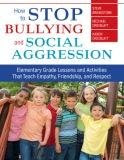Passive victims signal, through attitude and behaviors, that they are insecure and will not respond strongly if bullied. They are often:
-Physically weaker than others their age
-Afraid of being hurt, have poor physical coordination and don't do well in sports
-Have poor social skills and have difficulty making friends
-Are cautious, sensitive, quiet, withdrawn and shy
-Are anxious, insecure, and cry or become upset easily
-Have poor self-esteem
-Have difficulty standing up for or defending themselves, physically and verbally
Provocative victims express behaviors that often irritate others and incite negative reactions. They often:
-Have poor social skills -- appear to instigate the bullying
-Are hyperactive, restless, and have difficulty concentrating
-Are clumsy, immature, and exhibit irritating habits
-Do not develop strong friendships
-Are hot-tempered and attempt to fight back, ineffectively and sometimes entertainingly, when victimized
-Pick on smaller kids
If the bullied child has traits familiar to either list, altering their behavior may help reduce further bullying and develop self-esteem, resiliency and empowerment - qualities that will limit further victimization.For instance, teach passive victims to respond assertively to bullies with details that include specific language and how to express confident body language, eye contact, and tone of voice. These students will also need to practice social skills and learn activities appreciated by peers.
Provocative victims also need to learn age appropriate skills. They will need help from a caring adult to become aware of behaviors that generate negative reactions from others. They may also need help with emotional management techniques.
Social skills training should be incorporated into behavior plans, classroom lessons, and IEPs (Individualized Education Plans).
Although some behaviors do perpetuate bullying, no one ever deserves to be bullied!
For more information and other bully prevention strategies, contact Balance Educational Services 1-802-362-5448 © 2008 www.BalanceEducationalServices.com



No comments:
Post a Comment